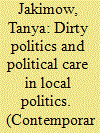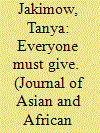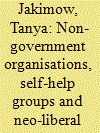| Srl | Item |
| 1 |
ID:
190937


|
|
|
|
|
| Summary/Abstract |
Politics is dirty’ is a truism, a taken-for-granted reality in much of the world, particularly in India. Its implications are likewise seen as inescapable. Scholarship examining women’s political underrepresentation often cites the ‘dirty’ nature of democratic politics as a key disincentive for women to participate. While not disputing that politics is, in some respects, ‘dirty’, I question the mechanisms through which it is said to hinder women’s political representation. Drawing upon ethnographic research with female party workers and elected municipal councillors in Dehradun, North India, I analyse how ‘dirty politics’ positions women as ‘out of place’ within the political realm. While both men and women engage in acts of political care, men can more easily transgress the boundaries between them, straddling both ‘dirty politics’ and a ‘politics of care’. This production of the ‘political’ as a realm unsuitable for women or mismatched with their activities, is one factor contributing to the underrepresentation of women in politics in South Asia, and beyond.
|
|
|
|
|
|
|
|
|
|
|
|
|
|
|
|
| 2 |
ID:
121837


|
|
|
|
|
| Publication |
2013.
|
| Summary/Abstract |
Bridegroom price is extracting a heavy toll on the poor in rural Telangana, Andhra Pradesh, India. Poor households are becoming indebted and losing assets to pay the increasing amounts demanded by grooms at the time of their daughters' weddings. Bridegroom price is a relatively recent phenomenon in the area, first practiced amongst scheduled and backward caste groups less than two decades ago. This article draws upon practice theory and cultural neo-institutionalism to offer an alternative explanation for the emergence and persistence of bridegroom price as a time, space and socially specific institution. Using empirical material from in-depth qualitative interviews in two villages in Telangana, Andhra Pradesh in 2010, it suggests that bridegroom price emerged as a result of shifts in the subjectivities of low-caste men, and in particular the evaluation of the self in relation to the social whole. The article seeks to contribute to existing explanations for bridegroom price and dowry, while also arguing that theoretically informed approaches are necessary in order to develop effective measures to combat these institutions.
|
|
|
|
|
|
|
|
|
|
|
|
|
|
|
|
| 3 |
ID:
092215


|
|
|
|
|
| Publication |
2009.
|
| Summary/Abstract |
In India the presence of a large number of non-government organisations (NGOs) is often seen to attest to the strength of its civil society. It is claimed that NGOs' close links with marginalised people can aid in the representation of the poor, thereby strengthening democratic processes in accordance with pluralist conceptions of civil society.1 Sangeeta Kamat's analysis of NGOs in India challenges this perspective. Using a Gramscian approach to civil society, she shows how NGOs can be agents in the securing of a consensus of the marginalised over unequal social and economic structures.2 It is therefore important to analyse the discrepancy between NGOs' normative and actual roles in civil society processes to understand democracy and development in India more generally.
|
|
|
|
|
|
|
|
|
|
|
|
|
|
|
|